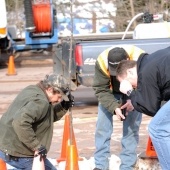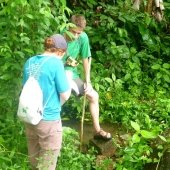A minor allows an undergraduate student to specialize in a secondary discipline. A student may minor in any subject, provided the title of the minor differs from the title of the student’s major or major concentration.
A student interested in adding this minor should first express their interest to the minor advisor and then use the Request to Change... link on the My Degree card in Experience to request the minor. See the Registrar’s Office website for more information.
Minors offered by our department are listed below.

Construction Management
Gain valuable industry-specific skills for the construction industry, including estimating, safety, scheduling, contracts, project management, and project controls. Students are introduced to industry-standard technologies and up-to-date methods that will prepare them for success.
Courses include:
- construction contracts
- construction project management
- construction planning and scheduling
- construction cost-estimating
- construction finance and accounting
- construction safety management

Ecological Engineering
Gain more experience working with natural systems. Broaden your expertise in engineering disciplines related to earth sciences, such as environmental engineering and forestry. You will have outdoor lab and field experience. Use design thinking to remediate and prevent environmental and ecological damage. Blend engineering and science, particularly ecology, to design sustainable systems in natural, urban, and agricultural settings.

Humanitarian Engineering
This interdisciplinary minor is designed to build competencies in intercultural sensitivity and community engagement. Learn to collaborate effectively with communities in the co-development of engineering solutions. Develop the skills necessary to partner with underserved communities to improve access to basic human needs. Work on a capstone project with a community on issues of water, sanitation, health care, mobility, or disaster mitigation.
Students may incorporate their iDesign, Enterprise, Engineers Without Borders, or other community-based capstone design credits or experience. This minor also aligns with Peace Corps Prep certificate program and the Global Community Development Partnerships minor administered by the Pavlis Honors College.

Municipal Engineering
A minor in municipal engineering prepares students for employment with a city or municipality and especially enhances a degree in civil engineering. Gain a working knowledge of the planning, design, building, and management of a municipality’s vital facilities. Courses in this minor area include:
- transportation engineering
- traffic engineering
- water and wastewater treatment
- water distribution and wastewater-collection-system design
- hydraulic structures, and more.

Rail Transportation
This minor is targeted to students with interests in rail transportation. The mix of discipline specific and multi-disciplinary class requirements for this minor provides students with the basic skills and background necessary to rapidly become effective specialists and leaders in the railroad industry. In addition to courses in rail transportation and engineering, students also learn logistics, management, leadership, and/or communications skills to meet the demands of rail industry careers. Railroads are looking for graduates with versatile skills, who can become effective engineers, managers and team leaders in various company positions, and understand the requirements placed by the industry on its professional staff.

Surveying
All land-based engineering projects begin with surveying to locate structure(s) on the ground. Surveying has been, and will continue to be an essential task of a surveyor. All US states and territories license surveyors. Advances in GPS technology have led surveyors to use Geographic Information Systems (GIS) for mapping. There is a growing need for surveyors who can reconcile traditional surveying information with digital information contained in a GIS database in order to produce more comprehensive maps. Students who complete a minor in surveying may be eligible for licensure depending on various state or territory licensing requirements. This minor is open to all students but may directly enhance job prospects for students in civil engineering, environmental engineering, forestry, geological engineering, and geology.
Courses in this minor include:
- geospatial concepts, technologies, and data
- geospatial information technology with elements of field cartography
- photogrammetry
- surveying computations and adjustments
- surveying field practice

Water Resource Recovery Technology
This minor is offered to students in the environmental engineering who may be interested in work at a water resource recovery facility (WRRF). Gain the experience to take and pass the Class D Certification exam and enter the work force as a Municipal Wastewater Treatment Plant Operator. Learn wastewater treatment options and administration. Enter a career in wastewater treatment plant design or wastewater equipment manufacture and sales. You will intern with a WRRF for this minor.